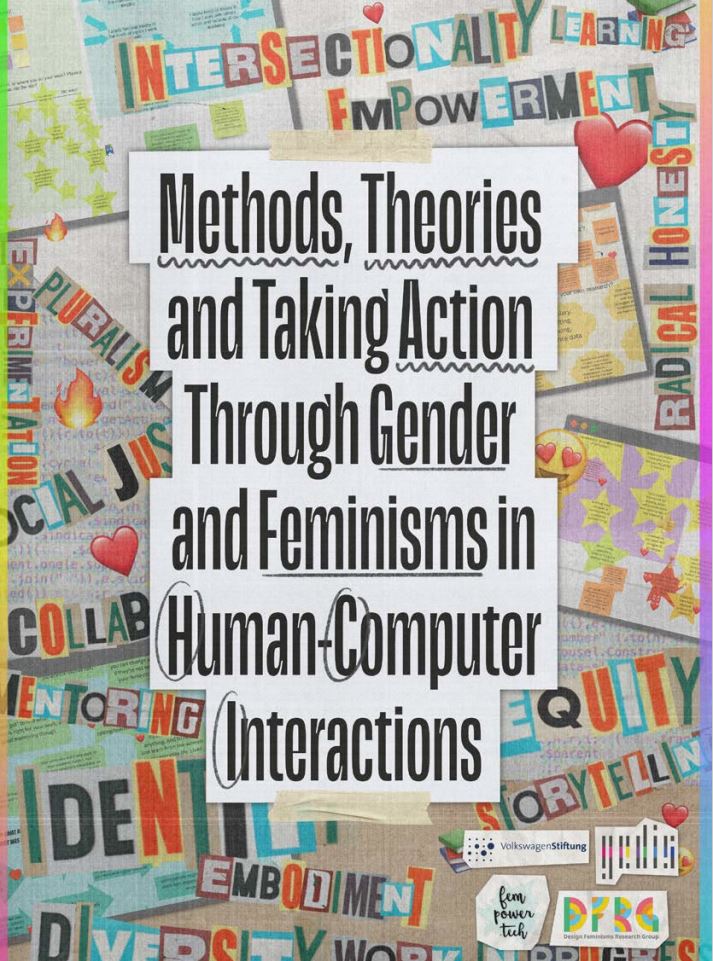November 9 & 10, 2023
09:00–12:30 BST / 10:00–13:30 CET / 04:00–07:30 ET / 20:00–23:30 AEDT
Hybrid workshop (online + at Goldsmiths, London, UK)
This workshop examines potential conceptual and practical correlations between Bayesian approaches, in statistics, data science, mathematics and other fields, and feminist and decolonial approaches to epistemology and the cultural study of science.
At the core of Bayesian data analysis is the process of “Bayesian conditioning”, where a prior probability (e.g. of a hypothesis) is updated to a posterior probability resulting from new empirical observations using Bayes’ Theorem (Gelman et al.). Subjective Bayesianism in turn is a statistical and philosophical approach to reasoning about conditional probabilities that conceptualises probability as an agent’s subjective degree of belief and the grounds on which that belief might be based (Hacking; Lynch and Bartlett). Whilst in some respects, subjective Bayesianism describes or provides a diagrammatic form of a simplified notion of “reason” (with the attendant figurations of westernness, patriarchy, coloniality and so on that may accompany it in unquestioned form) it also offers some interesting avenues for epistemological enquiry for approaches that question the loci and modalities of reason.
Subjective Bayesian approaches find resonances with what Marisol de la Cadena has called ‘onto-epistemic openings’ or scholars developing Feminist Standpoint Theory and situated epistemologies have called ‘situated knowledge’ (Haraway; Harding). Situated knowledge perspectives highlight the embodied and embedded nature of all knowledge claims, where embodiedness is not limited to human embodiment, and embeddedness extends beyond sociopolitical context to include disciplinary perspectives, technoscientific affordances and other more-than-human agencies. Such a position critiques the idea of universal reason and the “view from nowhere”, and opens a much more generative possibility of responsibility as response-ability, i.e. capacity to respond and be accountable for the knowledge claims made, and re-figure objectivity as “positioned rationality” (Haraway).
The workshop aims at exploring productive resonances (and dissonances) rather than snug correspondances between situated, pluriversal epistemologies and Bayesian approaches. This might include not only more general convergences and divergences, but also the role of materiality, subjectivity, situated reason, perspective measurement, probability, and other relevant concepts.
Schedule
November 9th
09:00 BST / 10:00 CET / 04:00 ET / 20:00 AEDT: Introduction by Matthew Fuller, Goda Klumbytė & Dominik Schindler
09:30 BST / 10:30 CET/ 04:30 ET / 20:30 AEDT: Alan F. Blackwell, Nic Bidwell, Rowan Hall Maudsley and Colton Botta, “Between the Pluriverse and the Multiverse: Sociotechnical perspectives on probabilistic programming languages”
10:30 BST / 11:30 CET/ 05:30 ET / 21:30 AEDT: David Gauthier, “Against “objects from nowhere”: On logos, sophistry, proofs, and the “being” of mathematical objects”
11:30 BST / 12:30 CET / 06:30 ET / 22:30 AEDT: Conrad Moriarty-Cole, “Pluralist Epistemologies and the Poetics of Opacity”
12:30 BST / 12:30 CET / 07:30 ET / 23:30 AEDT: Closing
November 10th
09:00 BST / 10:00 CET / 04:00 ET / 20:00 AEDT: Adrian Mackenzie and Anna Munster, “Diffusing observation through belief updates”
10:00 BST / 11:00 CET / 05:00 ET / 21:00 AEDT: Clemens Apprich, “AI Bayes – Bayesian Networks as Tools of Diagnosis”
11:00 BST / 12:00 CET / 06:00 ET / 22:00 AEDT: Closing discussion
Registration and Access
Please register using this registration link.
For any physical access questions, please email m [dot] fuller [at] gold [dot] ac [dot] uk
The workshop will be held as a hybrid event in English. The online event takes place on Microsoft Teams with automatic caption function of the digital platform enabled (an event link will be sent to you once you register). The physical event takes place at Goldsmiths, University of London. If you have any specific access needs for the online or physical event, please email the organisers.
Physical room on 9 November: Professor Stuart Hall Building 102
Physical room on 10 November: Professor Stuart Hall Building 305
To find the campus: https://www.gold.ac.uk/find-us/
Organisers
Matthew Fuller, Goldsmiths, University of London, m.fullerATgold.ac.uk
Goda Klumbytė, University of Kassel, goda.klumbyteATuni-kassel.de
Dominik Schindler, Imperial College, London, dominik.schindler19ATimperial.ac.uk
Website: https://enginesofdifference.org/2023/04/17/bayesian-knowledge/
Speakers
Clemens Apprich is head of the Department of Media Theory as well as the Peter Weibel Research Institute for Digital Cultures at the University of Applied Arts in Vienna, where he holds the Professorship for Media Theory and History since 2021. Apprich is a guest researcher at the Centre for Digital Culture, as well as an affiliated member of the Digital Democracies Institute at Simon Fraser University and of the Global Emergent Media Lab at Concordia University. His current research deals with filter algorithms and their application in data analysis as well as machine learning methods. Apprich is the author of Technotopia: A Media Genealogy of Net Cultures (Rowman & Littlefield International, 2017), and, together with Wendy Hui Kyong Chun, Hito Steyerl, and Florian Cramer, co-authored Pattern Discrimination (University of Minnesota Press/meson press, 2019). Currently, he is working on a new book about Animated Intelligence (Amsterdam University Press, forthcoming).
Nic Bidwell: For 18-years I applied my expertise in community-based, action research for technology design in the global south; working with rural inhabitants of Kenya, Mozambique, Namibia, South Africa, Uganda, India, Indonesia, Australia, Argentina and Mexico including indigenous people. My research has designed and informed successful tech initiatives and advocacy, and is sensitive to gender and local perspectives. I have mentored over 40 early career African researchers, including in founding AfriCHI. I am founding advisor to Namibia’s Internet Society (ISOC) and Groot-Aub community network. My collaborators range from not-for-profits to Microsoft Research. I have catalysed thought in the field of Human Computer Interaction (HCI) e.g. I initiated the first indigenous-led digital design panel and the first publications on decolonalism in the Assoc. for Computer Machinery (ACM).
Alan Blackwell is Professor of Interdisciplinary Design in the Cambridge University department of Computer Science and Technology (the “Computer Lab”). He has been designing programming languages since 1983, and carrying out research into Artificial Intelligence since 1985. He originally studied engineering, practising with professional certification in his home country Aotearoa New Zealand, before completing further degrees in Computer Science and Experimental Psychology. His multi-disciplinary interests have included an undergraduate major in comparative religion and 40 years as an orchestral musician. He has developed and taught university courses in Software Design and Software Engineering, Interaction with Machine Learning, Usability of Programming Languages, Human-Computer Interaction, Computer Music, and Theories of Socio-Digital Interaction. He is a Fellow of Darwin College Cambridge, co-founder with David Good of the Crucible Network for research in Interdisciplinary Design, and with David and Lara Allen the Global Challenges strategic research initiative of the University of Cambridge.
Colton Botta: I am on a mission to individualize education by leveraging Computer Science, AI, Cognitive Science, and Ethics. I hope to push the boundaries of learning, ensuring that every student is given a chance to reach their full potential. I was a 2021 Marshall Scholar and completed my first year at the University of Edinburgh, where I read for an MSc. in Cognitive Science. My research focused on “diversity-aware” reinforcement learning for sequencing educational content to students, under the guidance of Kobi Gal and Avi Segal. I have recently completed an MPhil in Engineering at the University of Cambridge. My research explores how to make probabilistic programming languages more user-friendly for students and non-experts, under the supervision of Hong Ge and Alan Blackwell.
David Gauthier: I am a scholar and media artist with an academic background in Mathematics, Media Arts and Sciences, and Cultural Analysis. My work fosters original means of studying objects and phenomena by making transdisciplinary connections between different modes of inquiry stemming from these distinct cultural and scientific traditions. My current research addresses computation by questioning what it is, and how, when, and where it operates. I am particularly interested in computational acts, the way computing machines and software are made to perform and execute, which call for a different conceptual understanding of “act” than our customary human-bounded understanding of action. I work at Utrecht University where I am Assistant Professor of Computational Media and Arts in the Media and Culture Studies department.
Adrian Mackenzie is a Professor in the School of Sociology, Australian National University. His research takes place at the intersections of media, sciences and technologies. It draws on STS, philosophy and media-cultural studies. He currently has research interests in machine learning platforms, human-nonhuman experience, technical ensembles, numbers, devices, sound, images, bodies, and extreme events. He is practising musician working across wind ensembles and electronic instruments.
Rowan Hall Maudslay is a PhD student at the University of Cambridge, and a Bye-Fellow of Magdalene College. Prior to that, he was a research assistant at ETH Zürich, and before that he completed his BA and MEng, both in Computer Science, at Cambridge. He is currently funded by the Leslie Wilson Vice-Chancellor’s Scholarship, and his research is additionally supported by a Turing Institute Enrichment Award. Rowan’s research concerns people’s ability to perceive abstract similarities shared by disparate things, which manifests in analogy and metaphor. He is currently studying this ability through the lens of conventional metaphors, which are metaphors that are widely used by a language community, and can be found in dictionaries. Conventional metaphors provide a unique opportunity to analyse analogy and metaphor, which have both so-far proved rather elusive and difficult to study. Previously, his research has focused on the interpretability of neural networks, and gender-bias mitigation in machine-learnt models.
Conrad Moriarty-Cole is a Senior Lecturer and the Course Leader for BA Media Communications in the School of Art, Film and Media. Before coming to Bath Spa University, Conrad held Lecturer posts in Digital Culture at University of Brighton, as well as Digital Humanities at King’s College London, and Cultural Studies at Goldsmiths College.
Moriarty-Cole’s research sits at the intersection of cultural studies, media theory, computer science, and philosophy, specialising in Artificial Intelligence and big data. The core focus of his current research, which he is preparing as a monograph, is a critical reinterpretation of the philosophical legacy of phenomenology, developing a post-phenomenological process metaphysics of technology, nature, and society.
Anna Munster is a Professor of Art and Design at the University of New South Wales, Australia and co-director of its newly formed Autonomous Media Lab. Her research focuses on new ways to theorise machine learning experience with emphasis on critical artistic interventions into AI and process philosophy approaches. She has written: An Aesthesia of Networks (2013, MIT) and Materialising New Media (2006, Dartmouth University); articles on media assemblages, networks and platforms, media art and process philosophy in Theory, Culture and Event, Journal of Cultural Analytics, Inflexions; contributed to Affects, Interfaces Events (Imbricate, 2021) and has co-authored chapters and articles with Adrian Mackenzie . Her new book Deepaesthetics: on computational experience in a time of machine learning will be published by Duke University Press. She is a practicing artist working across sound, video, data, and autonomous systems.
Organisers
Matthew Fuller’s books include How to Sleep: The Art, Biology and Culture of Unconsciousness (Bloomsbury 2018), How to Be a Geek: Essays on the Culture of Software (Polity 2017), with Olga Goriunova, Bleak Joys: Aesthetics of Ecology and Impossibility (Minnesota 2019) and with Eyal Weizman, Investigative Aesthetics: Conflicts and Commons in the Politics of Truth (Verso 2021). He is Professor of Cultural Studies at Goldsmiths, University of London and a member of the editorial collective for Computational Culture, a journal of software studies (http://www.computationalculture.net/).
Goda Klumbytė is an interdisciplinary scholar working between informatics and humanities & social sciences. Her research engages feminist new materialism, posthumanism, human-computer interaction and algorithmic systems design. In her doctoral research at the Participatory IT Design department at the University of Kassel, Germany she investigated epistemic premises of machine learning as a knowledge production tool and proposed innovative ways to work with intersectional feminist and new materialist epistemologies towards more contextualised and accountable machine learning systems design. She co-edited More Posthuman Glossary with R. Braidotti and E. Jones (Bloomsbury, 2022), and published work in Posthuman Glossary (Braidotti & Hlavajova, 2018), Everyday Feminist Research Praxis (Leurs & Olivieri, 2015), journals Online Information Review, Digital Creativity and ASAP, as well as presented at informatics conferences such as ACM’s CHI, nordiCHI and FAccT.
Dominik Schinder is a PhD candidate in Applied Mathematics at Imperial College London, supervised by Prof. Mauricio Barahona. Drawing from Network Science, Machine Learning and Topological Data Analysis, Dominik develops methods for the Computational Social Sciences and analyses conspiracy-related online communication as a Research Fellow at the Weizenbaum Institute Berlin. Prior to the PhD, Dominik received an MSc in Applied Mathematics from Imperial College and an MA in Digital Media from Goldsmiths, University of London.



